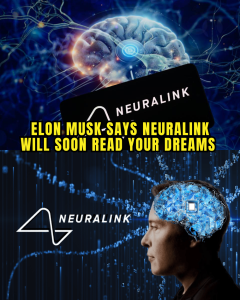“We’ll Know What You’re Afraid Of Before You Wake Up” — Elon Musk Says Neuralink Will Soon READ Your Dreams
The Boldest Leap in Human-Machine Interface Just Took a Darkly Fascinating Turn
In a statement that sent shockwaves through the tech world — and more than a few chills down spines — Elon Musk announced this week that Neuralink is now actively working on a feature that could allow its brain-computer interface to decode and interpret human dreams.

“We’re already seeing early neural patterns that correspond to emotional states during REM sleep,” Musk said during a livestreamed Q&A at the Neuralink research center. “In the next phase, we believe we’ll be able to capture and interpret not only the content of dreams — but the fears behind them.”
From Thought to Dream: The Next Frontier
Neuralink’s mission has always been audacious: merging man with machine by placing a high-bandwidth chip inside the human brain. But decoding unconscious thought — the domain of psychologists, mystics, and poets — marks an unprecedented leap.

According to Neuralink’s lead neuroscientist Dr. Ava Kozlova, the new feature is part of the company’s “Nightmind” initiative, which uses deep learning to map dream-state neural activity.
“It’s like translating a silent movie made of emotions, memory fragments, and symbolic logic,” Dr. Kozlova explained. “We’re not just listening to the brain — we’re learning to interpret its private language.”
Privacy or Power? Experts Voice Concern
As expected, the announcement has stirred major controversy.
Privacy advocates warn that reading dreams — especially without a user’s conscious participation — blurs the line between consent and surveillance.
“Dreams are our last private frontier,” says Dr. Emily Hart, an ethicist at Stanford University. “The idea that a company could mine your unconscious fears while you sleep is, frankly, dystopian.”
Musk dismissed those concerns during the livestream, saying, “Users would have full control. You’d only share what you choose to.”
But critics point to Musk’s history of bold promises and blurred boundaries between innovation and overreach.
What Could It Be Used For?
Neuralink engineers suggest dream decoding could revolutionize:
-
Mental health diagnostics: identifying recurring anxiety patterns or trauma responses.
-
Creative exploration: capturing dreams as raw material for art, film, and writing.
-
Enhanced self-awareness: helping people confront fears they don’t even consciously understand.
Some insiders even speculate it could lead to dream-sharing, allowing two Neuralink users to “visit” shared virtual spaces constructed from overlapping subconscious imagery.
Dreams… or Data?
Whether hailed as genius or madness, one thing is certain: Elon Musk isn’t done pushing the boundaries of what it means to be human in the age of AI.
“Everything we are — our hopes, our fears — starts in the brain,” he said, smiling. “Why should sleep be off-limits?”
Only time will tell whether this bold new future will be a dream come true… or a nightmare waiting to happen.
